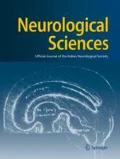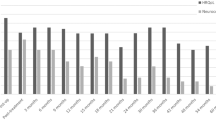Abstract
Thirtysix long-term survivors following the treatment of a malignant supratentorial brain tumor were examined for cognitive functions and global level of autonomy. Eighteen patients were symptom-free (SF) and 18 had clinical and neuroradiological recurrence (RE). The control group included 30 healthy subjects. All subjects underwent a neuropsychological battery for general and specific cognitive functions. The level of autonomy was assessed by means of the Karnofsky Performance Scale (KPS) for oncological patients. SF patients showed less impairment than RE patients both at the tests, as well as on the KPS. The cognitive deficits were subclinical in most SF patients, the tests for attention, memory and word fluency being the most sensitive in detecting subtle dysfunctions. The association between tumor location and specific cognitive deficits was inconstant in both patient groups. The results suggest that even subtle cognitive deficits can prevent SF long-term survivors from returning to premorbid autonomy and occupations, and that neuropsychological tests may be used as complementary routine indicators of their quality of life. Furthermore, our data show that, in selected patients, combined treatments and therapeutic insistence do not necessarily have the same deleterious effects.
Sommario
Trentasei pazienti, lungosopravviventi dopo il trattamento per un tumore sopratentoriale maligno, sono stati sottoposti ad und valutazione delle funzioni cognitive e del livello globale di autonomia. Diciotto pazienti erano asintomatici e 18 presentavano recidiva clinica e radiologica. Come gruppo di controllo sono stati esaminati 30 soggetti sani. Tutti i soggetti sono stati sottoposti ad una batteria neuropsicologica per la valutazione di funzioni cognitive generali e specifiche. Il livello di autonomia è stato definito mediante la scala di Karnofsky per pazienti oncologici. I pazienti asintomatici hanno mostrato una minore compromissione sia delle funzioni cognitive che del livello di autonomia rispetto a quelli con recidiva. I deficit cognitivi sono risultati modesti nella maggior parte dei pazienti asintomatici ed i test di attenzione, fluenza verbale e memoria sono apparsi i più sensibili nel rilievo di disfunzioni subcliniche. L'associazione tra sede del tumore e deficit cognitivi specifici è risultata incostante in entrambi i gruppi di pazienti. I risultati suggeriscono che deficit cognitivi anche lievi possono impedire il completo recupero dell'autonomia e delle attività premorbose nei lungosopravviventi asintomatici e che i test neuropsicologici possono fornire indici complementari nella valutazione routinaria della qualità di vita. I nostri dati inoltre mostrano che, in pazienti selezionati, l'insistenza terapeutica non induce necessariamente effetti deleteri.
Similar content being viewed by others
References
Anderson S.W., Damasio H., Tranel D.:Neuropsychological impairments associated with lesions caused by tumor or stroke. Arch. Neurol. 47:397–405, 1990.
Arrigoni C., De Renzi E.:Constructional apraxia and hemisphere locus of lesion. Cortex 1:170–197, 1964.
Basso A., Capitani E., Laiacona M.:Raven's coloured progressive matrices: normative values on 305 adult normal controls. Funct. Neurol. 2:189–194, 1987.
Benton, L.A., Hamsher K., Verney N.R.:Judgement of line orientation. In: Benton L.A., Hamsher K., Verney N.R. (Eds.): Contribution to neuropsychological assessment, Otfried Spreen, pp. 44–54, 1983.
Benton L.A.:Some problems associated with neuropsychological assessment. Bull. Clin. Neurosci. 50:11–15, 1985.
Bornstein R.A.:Classification rates obtained with standard cut-off scores on selected neuropsychological measures. J. Clin. Exper. Neuropsychol. 8:413–420, 1986.
Cavazzuti V., Fisher E.G., Welch K., Belli J.A., Winston K.R.:Neurological and psychological sequaele following different treatments of craniopharyngioma in children. J. Neurosurg. 59:409–417, 1983.
Crossen J.R., Goldman D.L., Dahlborg S.A.N., Neuwelt E.A.:Neuropsychological assessment outcomes of nonaquired immunodeficiency syndrome patients with primary central nervous system lymphoma before and after blood-brain barrier disruption chemotherapy. Neurosurgery 30:23–29, 1992.
Damasio A.R., Geshwind N.:Anatomical localization in clinical neuropsychology. In: Vinken P.J., Bruyn G.W., Klawans H.L. (Eds.): Handbook of clinical neurology, vol. 45: Clinical neuropsychology, Elsevier Publishers, pp. 7–22, 1985.
De Angelis L.M., Delattre J.K., Posner J.B.:Radiation-induced dementia in patients cured of brain metastases. Neurology 39:789–796, 1989.
De Renzi E.:Disorders of space exploration and cognition. New York: John Wiley and Sons 1982.
De Renzi, Vignolo L.A.:The Token test: a sensitive test to detect receptive disturbances in aphasia. Brain 85:665–678, 1962.
Donovan K., Samson-Fisher R.W., Redman S.:Measuring quality of life in cancer patients. J. Clin. Oncol. 7:959–968, 1989.
Fleck J.D., Einhorn L.J., Lauer R.C., Schultz S.M., Miller M.R.:Is prophylactic cranial irradiation in small-cell lung cancer? J. Clin. Oncol. 8:209–214, 1990.
Hochberg F.H., Slotnick B.:Neuropsychological impairment in astrocytoma survivors. Neurology 30:172–177, 1980.
Iimperato J.P., Paleologos N.A., Vich N.A.:Effects of treatment on long-term survivors with malignant astrocytomas. Ann. Neurol. 28:818–822, 1990.
Johnson B.E., Becker B., Goff W.B., et al.:Neurologic, neuropsychologic and computed cranial tomography scan abnormalities in 2− to 10− year survivors of small-cell lung cancer. J. Clin. Oncol. 3:1659–1667, 1985.
Karnofsky D.A., Abelmann W.H., Craver L.F., et al.:The use of nitrogen mustards in the palliative treatment of carcinoma. Cancer 1:634–656, 1948.
Karnofsky D.A., Burchenal J.H.:The clinical evaluation of chemotherapeutic agents in cancer. In: MacLeod C.M., (Ed.): Evaluation of chemotherapeutic agents. New York: Columbia University Press, pp. 191–205, 1949.
Lee Y.Y., Nanert C., Glass J.P.:Treatment-related white matter changes in cancer patients. Cancer 57:1473–1482, 1986.
Lieberman A.N., Foo S.H., Ranshoff J. et al.:Long-term survival among patients with malignant brain tumors. Neurosurgery 10:450–453, 1982.
Mackworth N., Fobair P., Prados M.D.:Quality of life self-reports from 200 brain tumor patients: comparisons with Karnofsky performance scores. J. Clin. Oncol. 14:243–253, 1992.
Marie J., Coudin B., Guerin J., Caudry M.:Neuropsychological impairment in adults with brain tumors. Am. J. Clin. Oncol. 10:156–162, 1987.
Mostow E.N., Byrne J., Connelly R.R., Mulvihill J.J.:Quality of life in long-term survivors of CNS tumors of childhood and adolescence. J. Clin. Oncol. 9:592–599, 1991.
Mulhern R.H., Kun E.:Neuropsychological functions in children with brain tumors: III. Interval changes in the six months following treatment. Med. Ped. Oncol. 13:318–324, 1985.
Schag C.C., Heinrich R.L., Ganz P.A.:Karnofsky performance scale revisited: reliability, validity and guidlines. J. Clin. Oncol. 2:187–193, 1984.
Sichez N., Fauchon F., Chantelard J.V., et al:Quality of life in long term survivors of astrocytomas treated with surgery and radiation therapy: a neuropsychological study. Abstract II Meeting European Neurological Society, p. S2, 1990.
Spinnler H., Tognoni G.:Standardizzazione e taratura italiana di test neuropsicologici. It. J. Neurol. Sci., suppl. 8, 1987.
Tannock I., Murphey K.:Reflectionon medical oncology: an appeal for better clinical trials and improved reporting of their results. J. Clin. Oncol. 1:66–70, 1983.
Vilkki J.:Differential perseverations in verbal retrieval related to anterior and posterior left hemisphere lesions.Brain Language 36:543–554, 1989.
Yates J.W., Chalmer, B., McKegney F.P.:Evaluation of patients with advanced cancer using the Karnofsky performance status. Cancer 40:2220–2224, 1980.
Author information
Authors and Affiliations
Rights and permissions
About this article
Cite this article
Giovagnoli, A.R., Boiardi, A. Cognitive impairment and quality of life in long-term survivors of malignant brain tumors. Ital J Neuro Sci 15, 481–488 (1994). https://doi.org/10.1007/BF02334609
Received:
Accepted:
Issue Date:
DOI: https://doi.org/10.1007/BF02334609




